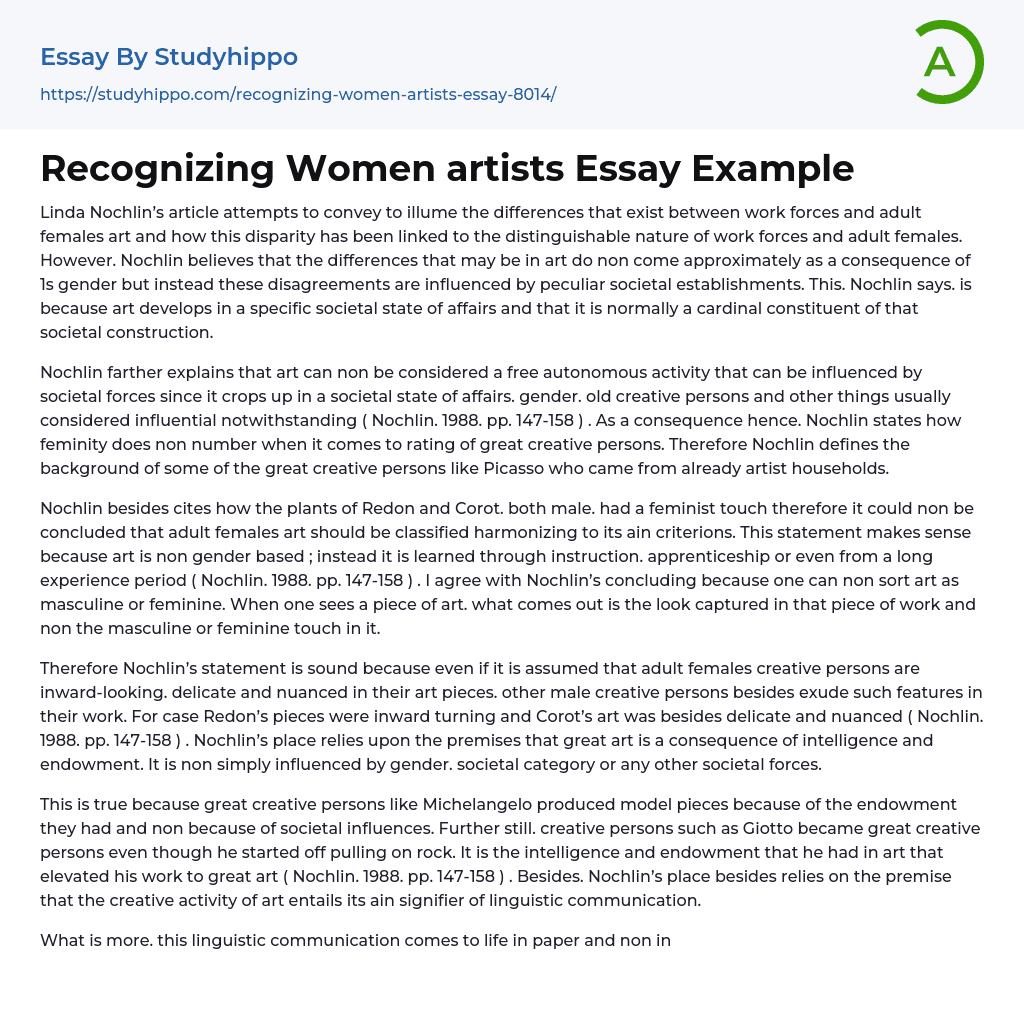In her article, Linda Nochlin discusses the disparities between men's and women's art and how these differences are influenced by societal institutions rather than gender. She argues that art develops within a specific social context and is shaped by that social structure. Nochlin also emphasizes that art is not a free autonomous activity, as it is often influenced by societal forces and various factors such as gender and the age of the artist. Therefore, Nochlin suggests that femininity should not be a determining factor in evaluating great artists. She provides examples of renowned artists, such as Picasso, who came from artistic backgrounds, and mentions how male artists like Redon and Corot incorporated feminist elements in their work. This demonstrates that women's art should not be categorized according to separate standards. Instead, Nochlin asserts that art is acquired through educatio
...n, apprenticeship, or long periods of experience. (Nochlin, 1988, pp.147-158)I agree with Nochlin's conclusion that art cannot be categorized as masculine or feminine. When viewing a piece of art, the focus should be on the expression captured within the work, rather than any gendered touch it may possess. Therefore, Nochlin's statement is valid because even if women artists are assumed to be introspective, delicate, and subtle in their art, male artists can also exhibit these qualities. For example, Redon's work is introspective and Corot's art is delicate and nuanced (Nochlin, 1988.pp.147-158). Nochlin's argument rests on the idea that great art is a result of intelligence and talent, not influenced by gender, social class, or other societal forces. This is true because artists like Michelangelo created masterpieces due to their inherent talent, not societal pressures. Additionally, artists suc
as Giotto became great despite humble beginnings drawing on stone. It was their intelligence and talent in art that elevated their work to greatness (Nochlin, 1988.pp.147-158). Furthermore, Nochlin's argument also assumes that the creation of art involves its own form of language. Additionally,This linguistic communication is brought to life in paper, rather than being merely narrated to others, thus neglecting the feminist impression in art. According to Nochlin (1988), this statement holds true because art is learned and perfected through experience, regardless of gender. Therefore, artists with experience can produce exceptional artwork, regardless of their gender. Art is not influenced by gender, as it is a learned skill that improves with experience. Additionally, great art primarily results from an individual's intelligence and talent, with societal factors playing a secondary role. Consequently, women's art deserves more attention and appreciation if individuals gain a deeper understanding of what art truly entails (Nochlin, 1988).
Reference:
Nochlin L. (1988). Why have there been no great women artists? Women, Art and Power and Other Essays. Westview Press.
- Tattoo essays
- Clothing essays
- Footwear essays
- Fashion design essays
- Cosmetic Surgery essays
- Jeans essays
- Social Construction of Gender essays
- Age Of Enlightenment essays
- Ethos essays
- Time essays
- Acceptance essays
- Meaning Of Life essays
- Reality essays
- Natural Law essays
- Political Philosophy essays
- Utilitarianism essays
- Existence essays
- Free Will essays
- Good And Evil essays
- Confucianism essays
- Relativism essays
- Conscience essays
- Environmentalism essays
- Empiricism essays
- Epistemology essays
- Ethics essays
- Existentialism essays
- Human Nature essays
- Individualism essays
- Metaphysics essays
- Philosophy Of Life essays
- Transcendentalism essays
- Truth essays
- Destiny essays
- Determinism essays
- Fate essays
- Functionalism essays
- Philosophers essays
- Pragmatism essays
- Future essays
- Child Observation essays
- Critical Reflection essays
- Teaching Philosophy essays
- Personal Philosophy essays
- Action Speak Louder Than Words essays
- Can Money Buy Happiness essays
- Values of Life essays
- Ethical dilemma essays
- Normative Ethics essays
- Virtue Ethics essays




